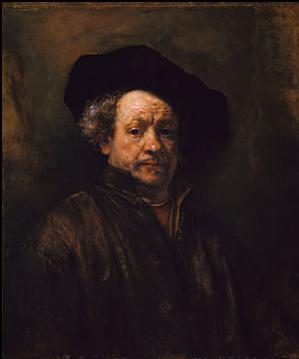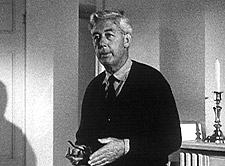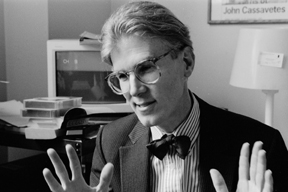|
Introduction
and Page 1 /
2 /
3 /
4 /
5 /
6 /
7 /
8 /
9 /
10 /
11 /
12 /
13 /
14 /
15 /
16 /
17 /
18 /
19 /
20 /
21 /
22 /
23 /
24 /
25 /
26 /
27 /
28 /
29 /
30 /
31 /
32 /
33 /
34 /
35 /
36 /
37 /
38 /
39 /
40 /
41 /
42 /
43 /
44 /
45 /
46 /
47 /
48 /
49 /
50 /
51 /
52 /
53 /
54 /
55 /
56 /
57 /
58 /
59 /
60 /
61 /
62 /
63 /
64 /
65 /
66 /
67 /
68 /
69 /
70 /
71 /
72 /
73 /
74 /
75 /
76 /
77 /
78 /
79 /
80 /
81 /
82 /
83 /
84 /
85 /
86 /
87 /
88 /
89 /
90 /
91 /
92 /
93 /
94 /
95 /
96 /
97 /
98 /
99 /
100 /
101 /
102 /
103 /
104 /
105 /
106 /
107 /
108 /
109 /
110 /
111 /
112 /
113 /
114 /
115 /
116 /
117 /
118 /
119 /
120 /
121 /
122
63
< Page 64 < 65
Ray Carney's Mailbag -- This section of the site contains letters written to Prof. Carney by students and artists, announcements of news, events, and screenings, and miscellaneous observations about life and art by Ray Carney. Letters and notices submitted by readers are in black. Prof. Carney's responses, observations, and recommendations are in blue. Note that Prof. Carney receives many more letters and announcements than he can possibly include on the site. The material on these pages has been selected as being that which will be the most interesting, inspiring, useful, or informative to site readers. Click on the first page (via the links at the top or bottom of the page)
to read an explanation of this material, why it is being posted, and how this relatively small selection was made from among the tens of thousands of messages Prof. Carney has received.
Click
here for best printing of text
Ray,
... I got the chance to watch "Mutual Appreciation" this past weekend, and really loved it. I finally understood the Cassavetes reference (at least, in one very specific instance) in that the weight of a late interaction between Ellie and Lawrence (similarly framed even, if i'm not mistaken, to the one between Peter Falk and Gena Rowlands at the end of "A Woman Under the Influence") relies completely on the time spent with them. Like Mike Leigh's "All or Nothing," where the whole movie builds and builds towards this really magical and human and quiet moment between two people. Incredible.
Mike Gibisser
Ray Carney replies:
Dear Mike,
Thanks. I've cut your letter in my posting since the earlier part dealt with personal matters strictly between us. But I enjoyed yourcomments about Bujalski and Cassavetes and concur with your general puzzlement about the critical linkage of the two filmmakers. To tell you the truth, I've never understood the comparison (beyond the kind of small overlap or similarity of a shot or scene that you mention). It strikes me as the typical "reviewer's stupid lumping of different things together." Just because both Bujalski and Cassavetes are a little grainy in their shooting or a little rough in their editing, doesn't mean that they have anything in common in a deep way. Dumb da dumb dumb. Maybe what got it started was just that I championed Andrew's movie, so the (stupid) reviewers assumed that it was Cassavetes-like. As if I wasn't capable of appreciating anything else. I sure as heck never compared them with each other. Andrew is a very, very interesting and good filmmaker, but he is not working in the Cassavetes vein at all. Cassavetes is desperate and emotionally extreme. Andrew is much calmer and emotionally controlled and moderate. The temperatures of the two artists' works are entirely different: Cassavetes' work is in-your-face and hot-blooded; Andrew's is even-tempered and mild and conciliatory. Cassavetes is the maestro of pain and suffering and anguish; Andrew is in favor of emotion recollected in tranquility. Cassavetes is as operatic as Verdi; Andrew is Renoirian in his sensibility. Cassavetes could never accept the conversational reconciliation that ends Funny Ha Ha or the group hug that concludes Mutual Appreciation. Andrew's is a fundamentally comic (in the classical sense of the term) sensibility; Cassavetes' is as tragic as Shakespeare. So much for reviewers' comparisons. But both are interesting in their different ways. Everything doesn't have to be like the last masterwork to be good. That's another reviewer's fallacy.
RC
(A note from Ray Carney to his readers: The writer of the previous note to me at the top of the page, Mike Gibisser, is one of the four or five most interesting young filmmakers to come to my attention in the past year or so. His Finally, Lillian and Dan is an absolutely astonishing piece of ultra-low-budget garage filmmaking. Almost a silent movie, the movie's delicate love story is played out--brilliantly, subtly played out, second by second, step by step--not in words, but almost entirely in the characters' gestures, body language, and facial expressions. Gretchen Akers, who plays the lead female lead is amazing. Her face is the most expressive thing I've seen on screen in a decade. Her face is the movie. She makes even buying groceries dramatic and exciting. And Lucy Quinn is almost as terrific in the supporting role playing the grandmother. What a sense of her body. What timing. And what an amazing voice. I didn't want to pass up this opportunity to recommend Gibisser's [and Ackers' and Quinn's] work to the world.)
Hello Ray,
First, thanks for your response. It's amazing how encouraging the truth is, even when it hurts or is slightly discouraging (because the lack of spiritual people and artists in my generation is, at times, terrifying.)
 |
|
Without any kind of intro, here are a couple more Mailer quotes, plus my latest thoughts:
“[Karl Marx] certainly didn't understand that atheism is not a way to win the world. You can't. Not by that route. Half the people alive - or is it three-quarters? - have instinctive notions that God exists. I think the real failure of Bolshevism, then Stalinism, was clinging to the idea that religion is the opium of the masses. Organized religion may well be its own species of narcotic, but the concept that we are part of diving Creation is something else altogether.... If we are ever going to have a great society in the future - which is hardly a guaranteed conclusion - if we ever build a world with real freedom, we may have to arrive at the recognition that we can dispense with fundamentalism, and live instead with the idea that God is a Creator, not a lawgiver.
Wow. What was that verse from the Bible: "You are no longer under the law..." I'd have to look for it, but the idea, as I understand it, is to live a spiritual life, which is something else entirely. In fact, just recently I've been thinking that God communicates with our human spirit when we are "in fellowship" with Him, just as our human souls communicate to each other through our voices, body language, etc. Of course we are unaware of this spiritual communication (most of the time,) because it is not a mental or emotional or physical experience. It's on the spiritual level, something morality and religion don't even come close to. (Mailer also said something along the lines of “more than likely, the more you pray, the further away you are from God.” Makes sense in the right context.)
It also, in a way, reminds me of that Lawrence quote you always mention, how people like Christ nailed to the cross. They'd rather have that still and dead mental icon, as opposed to a living spiritual relationship. (My dad loves that quote by the way. It lead us into a whole other discussion, but I don't want to digress just yet. [I might also have Lawrence's intended meaning wrong, so I apologize. That's just how I understood it.])
Mailer on the dying tradition of important art, real art, in our culture:
“Whole populations will be looking for technological power rather than exploring those moral questions they hope to ponder anywhere but in the serious novel....The best fiction has always been the seedbed for the most interesting and subtle moral questions, questions that, at best, go deeper than the wisdom you can receive in any church or synagogue or mosque. When it comes to moral paradox, theology is limited. It's too structured. Interesting, morality almost never fits prearranged moral codes.
 |
|
This is especially relevant to my life:
One thing I've noticed about the (few) spiritually hungry people of my generation is that they've truly lost all faith in church. Even if the church was speaking the truth, they won't go. This is not a bad thing, just a change, but where's the source of spiritual truth in this post-religious age? Well...very naturally, startlingly, excitingly, this movie I've been working on has become kind of a... “gathering” of people seeking out the truth and willing to share what truth they know. I rejected the (very few) actors who wanted to work with me, in favor of some very close spiritual friends of mind. Even though we haven't shot a single second of footage yet, just discussing the characters' souls and spiritual conflicts has been an enlightening experience, something I don't think we would've gotten outside of our discussions. I didn't intend for my film to turn out this way, but I think it might actually spiritually benefit those involved. (On a little different note, I tried for two years as a raging teenager to get a film made. Last year I tried again. It's amazing that this year things have “worked out,” not without some trials, of course. God really does promote you only when you're ready.)
Excited, terrified, sometimes discouraged, pushing on,
Reagan Molina
From: "cosmic shanti"
Subject: Re: independence
To Mr. Ray Carney Professor of Film and American Studies at Boston University,
I am a young Independent Film Maker, living and trying to make my films from my home land - India. As you must be aware, similar to your 'Hollywood' monster, we have our own ethical and moral demon - 'Bollywood'.
The concept of Independent cinema here in India is a close invisible, both in spirit and economy, and what little survives is dramatically and publicly 'categorized' into an off-beat section. But I ask who set this beat up in the first place and is cinema really about beats? 'They' did it is the answer i get.
 |
Aristotle with a Bust of Homer, 1653
Rembrandt (Rembrandt Harmensz. van Rijn) (Dutch, 1606–1669)
Purchase, special contributions and funds given or bequeathed
by friends of the Museum, 1961 (61.198)
Photo: www.metmuseum.org
|
'They' refer to bollywood - described as a cinema of escapism, designed to give hope to the masses of India. By referring to the masses as an entity, a section, 'they' have consciously summed up their intentions; its like trying to spear fish in a tank. The trick is to let them be masses, do not by any chance provide them with a stimulating and challenging cinema; cause god forbid if the masses ever turned into real thinking and matured people. So their escape is limited to area the size of an apple box or the cheap and un-stimulating narratives that lack any soul.
I was introduced to your books and essays two and half years ago - around the time i discovered cassavetes. Like you, i hated my first film (shadows). Since then I have read 2 books written by you, bought the cassavettes collection of DVD's (my greatest expenditure last year), and watched shadows over 10 times. My passion for cassavetes runs high, it crystallizes my words - so I should not go on about him any more.
To begin with my letter to you is an introduction, also an honor to have something written by me read by you. Further, i request for guidance in my pursuit to flower independent cinema in my country. More than its economy I feel it lacks spirit; the virtue to be truly independent and the courage to throw stones at giants.
I hope you have time to read and respond. Further, when I visit America (hopefully soon) I would definitely make a trip to Boston to try and meet you. My second trip would be made to Colorado where I would try to meet the late Stan Brakhage's family - another marvel well beyond time and space.
Regards,
Karan Boolani
Black Eye Films
Mumbai, India
RC replies:
Thanks, Karan, for the stirring, and kind, words.
 |
Rembrandt as Saint Paul (1661)
|
My hope is with the young. I was just saying something in the same vein to students in my American Independent Film course yesterday. I was telling them about the "pacification / flattery / disengagement / satisfaction / complacency agenda" of mainstream American film--and about how different Mark Rappaport's and Robert Kramer's work (which we are viewing in the course) is. They reveal the problems we face. They understand things that Hollywood ignores. We are not born free. We have to make that journey one step at a time, and each of us has to do it on his or her own, every inch of the way. No one can make it for us. Since you ask for it, my advice to you: Study the masters (Bresson, Tarkovsky, Jean Renoir, Kiarostami, Cezanne, Picasso, Degas, Stravinsky, Mozart, Bach, Beethoven, and all of the others). Sit at their feet. Humble yourself. Listen and learn from them. Then go your own way.
 |
Rembrandt Self Portrait (1660)
|
Last week was my school's spring break vacation and I spent a week in New York where I did the same thing. I went to see Paul Taylor at City Center to study his dances. I went to galleries 13 and 14, 26 and 27 in the Metropolitan Museum of Art and had long, deep, spiritual conversations with my dear old friends: Anthony Van Dyck, Peter Paul Rubens, Frans Hals, Rembrandt van Rijn. Right now, at this moment in my life, they are my best teachers. They have plumbed the depths. They have looked truth in the face. And, most magically of all, they have found a way to express their discoveries. They share a little more of them with me every time I visit them. Sweet, gentle, kind, oh-so-patient and loving friends. They remind me of what matters -- of what really matters in eternity. We talk about all of the things the world has temporarily forgotten or lost its mind about. The quiet, shy, tender truths that the panicked scream of the news and the flashy blare of pop culture drown out. They could give me more, faster, if I were smarter, but I'm a slow learner so it takes many visits, many conversations for me to understand what they are saying.
Study the great art of the past. Immerse yourself in it. Then leave it behind and go off in your own direction. Repeat nothing. Borrow nothing. Imitate nothing. Find your own personal path through the maze. Rejoice in your discoveries. Share them with others. Leave your maps, your notes, your jottings behind when you go for future explorers to benefit from.
May we meet some day.
Ray Carney
 A reply form Karan: A reply form Karan:
Hi,
I appreciate your swift and insightful response - your words leaped out of the screen and enveloped my sprit - your advice is a gift.
My submission to 'the masters' will be absolute and constant.
After your e-mail, I instantly invested in a collection of J.S Bach and Igor Stravinsky. To the ones i have already visited, I shall revisit, only this time I will enter bare-foot, light and less demanding.
I should keep you updated on future projects.
Thank you once again and you can be assured that you have my humble and pure support from the east.
Best Regards,
Karan Boolani
Black Eye Films
Mumbai, India
A note from Ray Carney about another recent unknown indie gem. I sent the following blurb to Nick Peterson to post on his web site after seeing his low budget indie musical Yellow:
Nick Peterson's Yellow is a breath of fresh air. Amid the grainy, the gritty, and the grim--in contrast to virtually every other American "first film" out there--Peterson brings the brightness, the brilliance, the wonder, and the mystery of poetry (and song!) to his work. He has the best, the most exciting"eye" of any recent young filmmaker. Yellow is visually delicious, acoustically dazzling, and completely original, fresh, and new in its sensibility. And it doesn't hurt that it is deeply perceptive and penetrating as well. It is an eye- and ear-opener of a film--one of my favorite "unknown masterworks" of the recent past. --Ray Carney
"One more lost film," "ho hum," "whassup" category: Where is  Robert Bresson's Four Nights of a Dreamer? How can such a monumental masterwork be unavailable on tape, on disk, in 16mm, in 35mm--in any and every format? And be unavailable everywhere? In the U.S.A. In Canada. In England. In France. In Spain. In Italy. Where are the heads of the world's major film archives in terms of speaking out about this situation? Where are the curators of MoMA, of the BFI, of the Cinémathèque Française when we need them? Where are the letters to the editors from the world's film scholars? Where are the puzzled or enraged articles in the world's film magazines? Does no one protest? Is no one trying to change this situation and make this masterwork available? How can that be? Does no one care? (See the note on the bottom of the preceding Mailbag page, page 63, accessible via the blue page menus at the top or bottom of this page, for more on the subject of "lost," "forgotten," or unavailable films.) Robert Bresson's Four Nights of a Dreamer? How can such a monumental masterwork be unavailable on tape, on disk, in 16mm, in 35mm--in any and every format? And be unavailable everywhere? In the U.S.A. In Canada. In England. In France. In Spain. In Italy. Where are the heads of the world's major film archives in terms of speaking out about this situation? Where are the curators of MoMA, of the BFI, of the Cinémathèque Française when we need them? Where are the letters to the editors from the world's film scholars? Where are the puzzled or enraged articles in the world's film magazines? Does no one protest? Is no one trying to change this situation and make this masterwork available? How can that be? Does no one care? (See the note on the bottom of the preceding Mailbag page, page 63, accessible via the blue page menus at the top or bottom of this page, for more on the subject of "lost," "forgotten," or unavailable films.)
Prof. Carney:
I was transported by your posting about visiting the galleries in the Metropolitan Museum of Art and your "conversations" with "your old friends" there.
I found the following quotes that I wanted to share with you and your readers. (Sorry, I couldn't find any by Anthony Van Dyck or Frans Hals.)
Peter Paul Rubens:
"My talent is such that no undertaking, however vast in size... has ever surpassed my courage."
"I paint a woman's big rounded buttocks so that I want to reach out and stroke the dimpled flesh."
"Every child has the spirit of creation. The rubbish of life often exterminates the spirit through plague and a souls own wretchedness."
"Painting a young maiden is similar to cavorting with great abandon. It is the finest refreshment."
"My passion comes from the heavens, not from earthly musings."
"I'm just a simple man standing alone with my old brushes, asking God for inspiration."
"I am a peace-loving man. I believe that it ought to be the first wish of every honest man to live in tranquility of mind. I am sorry that all kings and princes are not of this humor."
Rembrandt van Rijn:
"Choose only one master - Nature."
"Painting is the grandchild of nature. It is related to God."
"Practise what you know, and it will help to make clear what now you do not know."
"The deepest and most lifelike emotion has been expressed, and that's the reason they have taken so long to execute."
"A painting is finished when the artist says it is finished."
"But his faith is a faith that to him is real, and it is a faith, in my judgement, that sustained him through the hard times in his life."
"Of course you will say that I ought to be practical and ought to try and paint the way they want me to paint. Well, I will tell you a secret. I have tried and I have tried very hard, but I can't do it. I just can't do it! And that is why I am just a little crazy."
"Without atmosphere a painting is nothing."
"Try to put well in practice what you already know. In so doing, you will, in good time, discover the hidden things you now inquire about."
*****
And I can't resist throwing in for free this great quote I found by Picasso:
"From the moment that art ceases to be food that feeds the best minds, the artist can use his talents to perform all the tricks of the intellectual charlatan. Most people can today no longer expect to receive consolation and exaltation from art. The 'refined,' the rich, the professional 'do-nothings', the distillers of quintessence desire only the peculiar, the sensational, the eccentric, the scandalous in today's art. I myself, since the advent of Cubism, have fed these fellows what they wanted and satisfied these critics with all the ridiculous ideas that have passed through my mind. The less they understood them, the more they admired me. Through amusing myself with all these absurd farces, I became celebrated, and very rapidly. For a painter, celebrity means sales and consequent affluence. Today, as you know, I am celebrated, I am rich. But when I am alone, I do not have the effrontery to consider myself an artist at all, not in the grand old meaning of the word: Giotto, Titian, Rembrandt, Goya were great painters. I am only a public clown - a mountebank. I have understood my time and have exploited the imbecility, the vanity, the greed of my contemporaries. It is a bitter confession, this confession of mine, more painful than it may seem. But at least and at last it does have the merit of being honest." (Pablo Picasso, 1952)
Thank you so much, Prof. Carney. You and your work are a national treasure.Thank you for doing what you do. For being what you are. It is so important, all the more in the world we live in today.
Sincerely yours,
Margaret (last name withheld at the writer's request)
A note from Ray Carney:
This restoration dispatch was just sent to me by my friend Ross Lipman who is head of restoration at UCLA and who was instrumental in advising me about the protection and restoration of the print of the first version of Shadows that I discovered a few years ago. Ross is a great guy and a great preservationist. I highly recommend the new print of Burnett's Killer of Sheep in particular when it comes to a city near you. This press release only lists the New York and Los Angeles openings, but the film will be touring to many other major cities, including Boston later in April.
Friday, March 30th, KILLER OF SHEEP - IFC Center, NY. US Restoration premiere (with modifications in consultation with Charles Burnett); intro by Ross Lipman.
Friday, April 6th, KILLER OF SHEEP - NuArt Cinema, Los Angeles. Intros by Henry Sanders, Ross Lipman.
Tuesday, April 17th, 7:30 - ANGER RISING: THE RESTORATION OF WORKS BY KENNETH ANGER. 35mm clip lecture by Ross Lipman. Pacific Film Archive, Berkeley, CA.
Subject: Nun of Monza
u listed Nun of Monza as one of your viewing recommendations and said it is directed by Luchino Visconti. Isn't it directed by Luchino's nephew Eriprando and it's a Nunsploitation movie???? Usually that kind of movie is not my cup of tea, but since u listed on your site, i'm very curious about it, because it could be not a usual nunsploitation movie.
yuki aditya
PS: I'm from Indonesia (maybe u haven't heard lots about my country) who's been one of your avid fan and thank you a lot for your works on Cassavetes, u really open my eyes how to watch movie from different side.
RC replies:
Subject: the U.S. and stupidity -- but I repeat myself
As I mention somewhere on the site, the viewing recommendations were sent to me  by various readers of the site. I added a few titles or notes of my own to the list, but have not personally viewed all of the films on it. So, in short, I have not seen The Nun of Monza and can't answer your question. Perhaps a reader of the site can help us both out. by various readers of the site. I added a few titles or notes of my own to the list, but have not personally viewed all of the films on it. So, in short, I have not seen The Nun of Monza and can't answer your question. Perhaps a reader of the site can help us both out.
All best wishes to you and any other Indonesian readers. The U.S. media in all of the various forms (newspapers, radio, television, magazines), and U.S. journalists are so provincial, so stupid, so uninformed, so chauvinistic, so jingoistic, so racist, and so bigoted in their coverage of non-U.S. cultures and parts of the world that I have to confess to knowing almost nothing about Indonesia (beyond the lurid and sensationalistic reports about Muslims and violence that appear in U.S. newspapers). I am certain that that can't be a fair representation of life there, so especially appreciate your note for that reason.
I wish you well. Thanks for your generous words about my work.
Ray Carney
P.S. "Nunsploitation"--what a concept. You got me there. : )
A note from RC: a response from a reader to my puzzlement in the preceding postscript:
Mr. Carney:
FYI, Here is a French definition of nunsploitation: nom parfois donné à des films se déroulant dans des couvents et mettant en scène des nonnes lesbiennes sado-maso et satanistes. Joe d'Amato (de son vrai nom Aristide Masaccesi) est le créateur et pratiquement le seul représentant de ce "genre", bien que Jesus Franco en ait également tâté.
Merci beaucoup for your work,
JM
A note from Ray Carney: I recently sent the following email to Joe Swanberg, the director of the new and unreleased Hannah Takes the Stairs:
Joe,
I love Hannah Takes the Stairs! I just looked at it tonight.
Greta Gerwig is amazing. One of the most expressive faces I've ever seen on film.
And Mark Duplass's and Andrew Bujalski's and Kent Osborne's performances are very, very strong too.
What a triumph of ensemble playing and improvisational acting.
If you don't mind me telling tales out of school: A few friends told me that the film was "soft" or "slight." But they are just plain wrong. It's not at all. It's delicate. It deals with small emotions and shifting interactions delicately, tenderly, sensitively. You put twenty-first-century love under a microscope. You reveal so many beautiful, sad, tender flickers of feeling, so many touching, sliding, moving flutters of emotion--things that are there every minute and every day in our relationships with others, but that we almost never stop or take the time to see or hear in life. That's not doing anything soft or slight. That's doing something wonderful and important and beautiful.
Thanks so much for sharing your (and your collaborating actor-writers') observations and insights with me. I feel like an anthropologist from another planet who has had some of the secrets, joys, and pains of earth love revealed to him for the first time.
Bravo. And thanks.
Ray
63
< Page 64 < 65
Introduction
and Page 1 /
2 /
3 /
4 /
5 /
6 /
7 /
8 /
9 /
10 /
11 /
12 /
13 /
14 /
15 /
16 /
17 /
18 /
19 /
20 /
21 /
22 /
23 /
24 /
25 /
26 /
27 /
28 /
29 /
30 /
31 /
32 /
33 /
34 /
35 /
36 /
37 /
38 /
39 /
40 /
41 /
42 /
43 /
44 /
45 /
46 /
47 /
48 /
49 /
50 /
51 /
52 /
53 /
54 /
55 /
56 /
57 /
58 /
59 /
60 /
61 /
62 /
63 /
64 /
65 /
66 /
67 /
68 /
69 /
70 /
71 /
72 /
73 /
74 /
75 /
76 /
77 /
78 /
79 /
80 /
81 /
82 /
83 /
84 /
85 /
86 /
87 /
88 /
89 /
90 /
91 /
92 /
93 /
94 /
95 /
96 /
97 /
98 /
99 /
100 /
101 /
102 /
103 /
104 /
105 /
106 /
107 /
108 /
109 /
110 /
111 /
112 /
113 /
114 /
115 /
116 /
117 /
118 /
119 /
120 /
121 /
122
|










